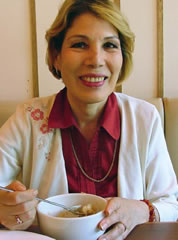A Healthful Lifestyle At Any Age

Toshie Inoshita, enjoying her lunch
“meal”
mom, who is more than 60 years old, lives seemingly happily and independently. As long as I can remember, she has eaten healthfully - lots of vegetables, tofu, fish and whole grains. Recently, however, I’ve overheard her saying that she does-n’t like to take the time to prepare meals, so instead she has been buying convenience foods or snacking on less healthful foods rather than eating actual meals. It worries me, but unfortunately these behaviors can signal the start of what many aging adults experience with food and eating behavior.
The aging population is growing, especially here in Hawaii, where according to the University of Hawaii’s Center on the Family, approximately 19 percent of our population is 60 years of age or older (compared to 17 percent nationwide). It is estimated that by the year 2020, this number will double to 25 percent, and one out of every four people in Hawaii will fall into this category. We all will likely be touched by this shift in population, whether aging ourselves or shouldering caregiving responsibilities for our elderly family members. We may find ourselves in both situations, as life expectancy for women in Hawaii is 82.5 years and 77.1 years for men.
Whether an aging senior or a caregiver to a loved one, there are commonly expressed concerns, the most prevalent relating to food, eating and nutrition. Food, after all, is critical to our well-being, affecting one not only physically and psychologically but also socially and culturally. An individual’s nutritional status is a major determinant of how well one will do as he or she ages and to what extent they will remain active and independent.
For older adults, there are a number of problems that can arise and affect one’s ability to eat. Below are some common problems and suggestions to overcome them:
* Blunted sense of taste and smell. Taste and smell naturally decline with age. This can be detrimental as it can lead to a disinterest in food and subsequent lack of adequate food intake. Try highly seasoned foods with spices and herbs, or foods with sauces to increase flavor.
* Loss of appetite. This also occurs naturally with age, as older adults tend to be less hungry and get full faster. However, appetite loss can also be due to a variety of other reasons, such as a side effect of medical treatment and medications, or loneliness. Determine the cause and address it (i.e., ask the doctor if a change in medication is possible, and try eating with others as people tend to have better appetites and eat more when dining socially).
* Chewing difficulties. These can be caused by missing teeth, ill-fitting dentures, or poor dentition. Try different types of foods that are softer in texture. For example, choose a papaya instead of an apple, or canned fruit peaches, pears or applesauce instead of crunchy fresh fruits.
* Limited access to food; restricted transportation or mobility to shop for food or cook, or limited income. There are a variety of community resources available to assist seniors or their caretakers with needs related to these limitations. A good place to start is Aloha United Way. Dial 211 for assistance to find the necessary help. Aloha United Way has programs which assist with transportation, senior activities, home-health and personal care, and pension counseling. Program staff can help with shopping, choosing nutritious foods, and selecting foods that require minimal preparation. There are also a variety of community nutrition programs available, such as congregate dining sites. These sites provide hot meals for seniors in a community setting, and also provide social interaction with other seniors.
Barriers to eating can lead to health issues and general decline in one’s quality of life. Some of the more common results are malnutrition, dehydration, anorexia, anemia and constipation. Being attentive to signs of eating issues is crucial to prevention. Look for signs such as:
* Disinterest in food or loss of appetite - often indicated by pushing food around the plate or picking at food
* Unintentional weight loss * Dehydration - one’s sensation of thirst diminishes with age, so conscious water intake is important. Many seniors avoid drinking fluids due to fear of incontinence or because doing so increases frequency of urination. Dehydration can result in constipation, cognitive decline and even death. It is often visibly signaled by poor skin turgor and sunken eyes.
Confusion or forgetfulness - oftentimes, seniors may forget to eat or think they have already eaten when they have not. Caregivers should occasionally question the senior’s eating schedule and if there is doubt, monitor closely.
It is said that age is not defined by a chronological age, but by the mental and physical state of a person. The senior population ranges from those who are fully independent and active to those who require more assistance. The adoption of a healthful diet and lifestyle practice at any age will help prevent and manage disease, maximizing one’s chances for successful aging and an independent and active senior life. You can believe I’m going to be paying lots of attention to my mom’s eating habits!
Mia Inoshita is a dietitian for Meadow Gold Dairies Hawaii.
E-mail this story | Print this page | Comments (0) | Archive | RSS Comments (0) |
Most Recent Comment(s):





 Del.icio.us
Del.icio.us







